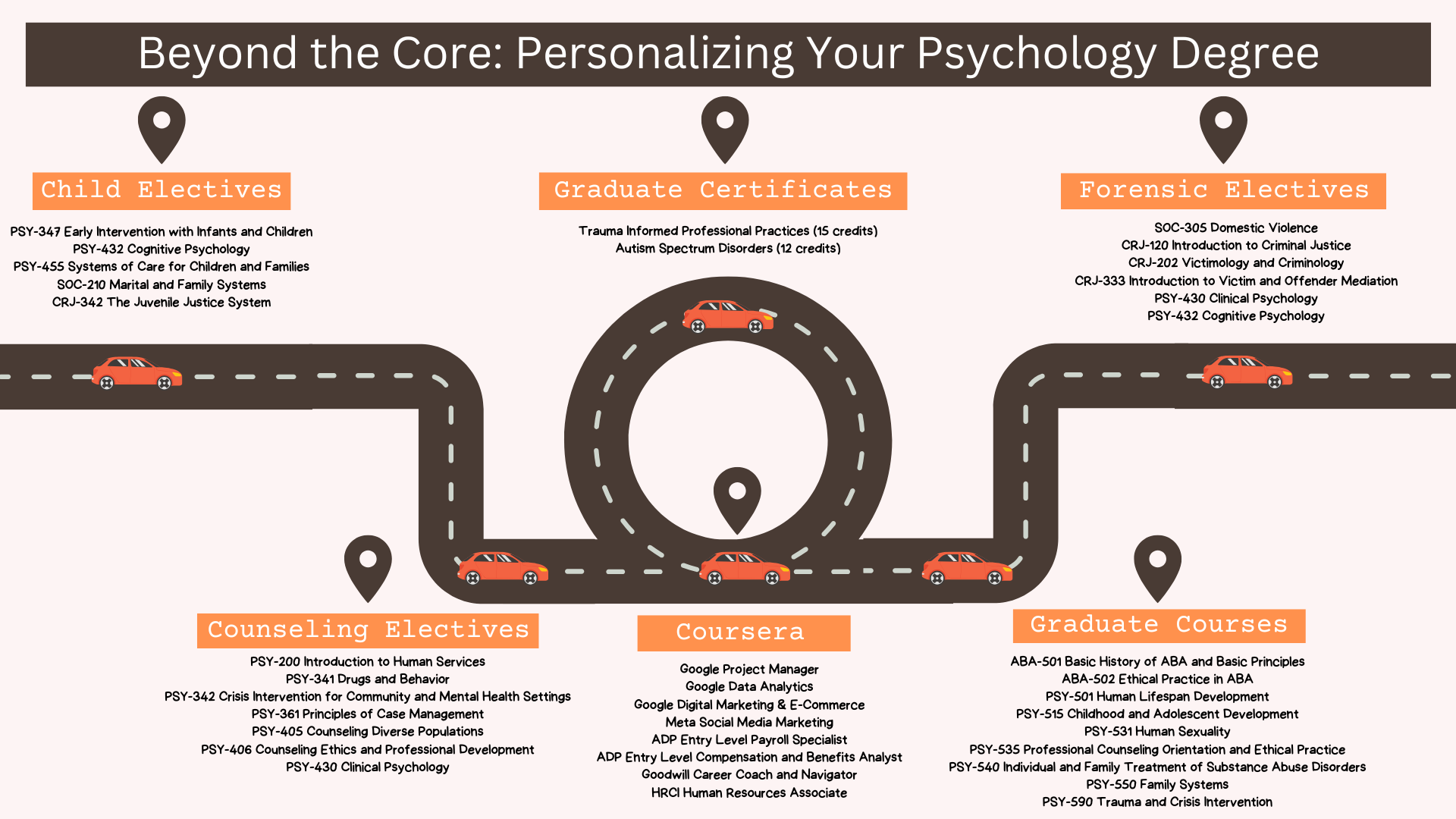Customizing Your Educational Journey
This section is designed to help you explore how you can customize your academic journey to align with your unique personal, academic, and professional goals. Bay Path University empowers you to tailor your psychology program by selecting from a variety of distinct opportunities. This includes choosing general electives, enrolling in graduate-level courses, completing a graduate certificate, earning an industry-backed credential through Coursera, or gaining credit for your prior learning (PLA) experiences. Read more below to learn more.

General Electives
General electives offer a fantastic opportunity to truly personalize your psychology degree. This is your chance to select courses that directly align with your unique personal interests, academic curiosities, and professional aspirations. While we’ve provided a few suggestions here, remember that these are just a starting point. We strongly encourage you to explore the full course catalog to discover the wide array of other available courses that could enrich your academic journey.
| Child Psychology | Forensic Psychology | Counseling Psychology | Human Services |
| CRJ-342 The Juvenile Justice System | CRJ-120 Introduction to Criminal Justice | PSY-200 Introduction to Human Services | PSY-200 Introduction to Human Services |
| PSY-347 Early Intervention with Infants and Toddlers | CRJ-202 Victimology and Criminology | PSY-341 Drugs and Behavior | PSY-342 Crisis Intervention |
| PSY-361 Principles of Case Management | CRJ-333 Introduction to Victim and Offender Mediation | PSY-342 Crisis Intervention | PSY-360 Understanding the Ability in Disability |
| PSY-432 Cognitive Psychology | PSY-430 Clinical Psychology | PSY-361 Principles of Case Management | PSY-361 Principles of Case Management |
| PSY-455 Systems of Care for Children and Families | PSY-432 Cognitive Psychology | PSY-405 Counseling Diverse Populations | PSY-455 Systems of Care for Children and Families |
| SOC-210 Marital and Family Systems | SOC-305 Domestic Violence | PSY-406 Counseling Ethics and Professional Development | |
| PSY-430 Clinical Psychology |
Graduate-Level Courses
Unlock your future and elevate your education by enrolling in graduate-level courses today! As an undergraduate student, you have the opportunity to seize the chance to fast-track your academic journey by enrolling in our dynamic and challenging graduate courses. Gain a head start on your postgraduate education, delve into advanced topics, and set yourself apart in the competitive job market. Fuel your passion for learning, broaden your horizons, and pave the way for a successful career. Take some time to explore available graduate-level courses (500 level or higher) that align with your interests and goals in the Academic Catalog.
Undergraduate students can enroll in up to 10 credits of graduate coursework (courses at or above the 500-level).
In order to be eligible, students must meet the following eligibility requirements:
- Have at least a 3.0 cumulative GPA
- Earned a minimum of 60 credits
Want to learn more? Check out the graduate enrollment policy in the Academic Catalog, or speak with your academic advisor if you are interested in exploring this opportunity further.
Graduate Certificates
To be eligible to enroll in a graduate certificate, students must meet the following criteria at the time of their request: have at least a 3.00 cumulative GPA; have earned a minimum of 60 credits. See the Academic Catalog for more information.
| Certificate | Total Credits |
| Autism Spectrum Disorder | 12 credits |
| Trauma Informed Professional Practices | 15 credits |
Earn An Industry Credential: Career Academy
Bay Path University is proud to partner with Coursera Career Academy to offer a wide variety of industry-developed professional microcredentials that prepare you with cutting-edge skills needed for in demand jobs!
Explore your options of the available microcredential courses here.
If you would like to search for credentials by career, search here.
Credit for Prior Learning: PLA
Students have the opportunity to earn college credit for what they’ve already learned professionally, academically, or personally through the Prior Learning Assessment (PLA) program. This can be done via CLEP exams, Computer Challenge Exams, or by creating a portfolio. To pursue portfolio credit, students take an online course (PLA 250) to learn how to prepare a portfolio aligning their knowledge with college-level courses. Students can earn up to 36 credits this way, but some programs may have restrictions, and specific guidelines are in the PLA Handbook. Learn more here.
Past Example: A student who works for the State of CT as a Crisis Intervention Specialist, responsible for investigating sexual assault and sexual violence claims and cases, and who works directly with those who have been victimized, earned 9 credits for the following courses: PSY-380 Interviewing and Counseling, PSY-336 Psychology of the Female Offender, and PSY-342-Crisis Intervention.
Internships
Ready to gain valuable professional experience, connect classroom learning to real-world application, and expand your career network? We partner with students to create innovative pathways for personal and professional advancement, offering diverse internship opportunities that range from virtual job shadowing to for-credit experiences.
While the university has resources and supports in place to assist you as you search for an internship, it is ultimately the student’s responsibility to find their placement. Below are some helpful resources for finding work-based learning experiences:
Hours Required for An Internship
| Number of Internships Hours | Total Credits Earned |
| 40 hours | 1 credit |
| 120 hours | 3 credits |
| 240 hours | 6 credits |